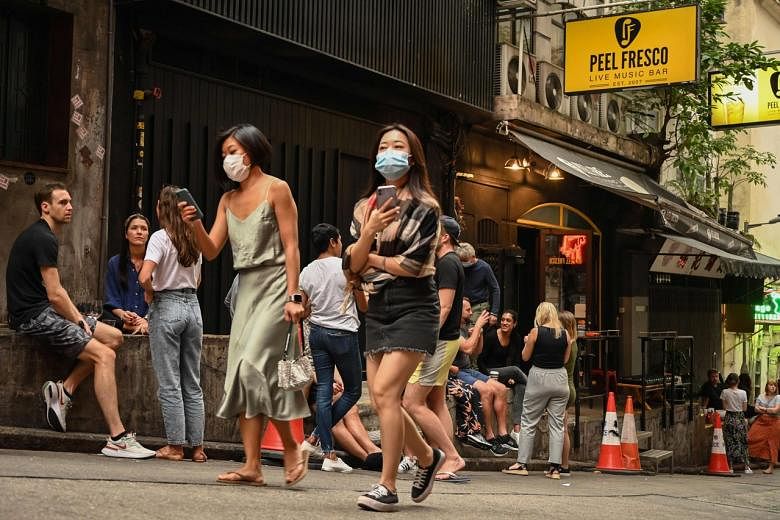HONG KONG - For a group of tai tais in the city, dancing without a care in the world has proven to be quite infectious, especially when masks are off and they mingle in close proximity with others.
A cluster linked to at least 21 dance clubs in Hong Kong has seen 250 patients stricken with Covid-19 - including a growing list of prominent women such as billionaire Rossana Wang Gaw and Madam Nancy Chiu, wife of Mr David Chiu, the owner of Cable TV and chairman of Far East Consortium.
The fast expanding cluster, however, may not be the cause of the fourth wave.
Dr Leung Chi Chiu of the Hong Kong Medical Association told The Straits Times he believes the fourth wave arrived soon after the third wave ebbed in early September as measures were eased then before local transmission was eliminated.
The respiratory specialist noted that the government made the decision under economic pressure and because people were tired of social distancing.
Coupled with the Mid-Autumn and Double Ninth Festivities in October, it was a recipe for "excessive social mixing and gatherings" that led to greater local spread, said Dr Leung.
Infections rebounded from mid-September to October and by the time November arrived, there were more than 30 local cases in the first two weeks of the month.
"Because of the delay in the institution of control measures, the increase in the number of community transmissions triggered super-spreading event among the dancing club-goers," said Dr Leung.
Hong Kong on Wednesday (Nov 25) recorded 85 confirmed cases, including one imported case. The source of infection for 16 of the 84 local cases remains unknown.
Another 60 people are positive after preliminary tests, but have not been listed as confirmed cases. The city now has 5,866 cases and 108 deaths.
Of the 84 local infections, 63 were linked to the dance club cluster. The dance clubs operate as a mix of dance studios and party rooms, where functions can be held and food and drinks are served.
"Even if you close down all the dancing facilities, that would not be enough because this activity only constitutes a small part of the total activities involved (in Covid-19)," Dr Leung said, adding that the dancers would have come into contact with others from different stratas in the last three weeks.
"We are going to see not only those coming out of the incubation period but also second and third generations in the coming weeks," he warned.
The escalating pandemic has already scuppered the Singapore-Hong Kong travel bubble, where the first flights were scheduled for Nov 22.
The government on Wednesday ordered applications for dancing activities in indoor facilities it manages to be suspended from Thursday and for all such activities to be banned from Saturday until further notice. Masks are to be worn in indoor facilities while dance programmes would be cancelled and refunds arranged.
Earlier it had ordered bars, pubs, nightclubs and saunas to close again from Thursday for a week, a decision that angered many in the food and beverage industry who feel the move is unfair as no clusters linked to the sector have yet been detected.
Industry players have said that up to half of the 1,400 licensed bars risk folding, while some larger restaurants may also face the same fate as banquets must be capped at 40 people from Thursday.
Beyond the tighter rules and forced testing of those who have visited dance clubs, Dr Leung thinks the government needs to quickly limit a wide range of activities to control the situation.
For instance, civil servants must work from home now so that the private sector can follow. Face-to-face classes must be stopped and non-essential, religious, recreational and sports activities that involve crowds, especially those indoors, must be suspended.
"If you want to contain a major forest fire involving multiple spots, you need to contain the spread of the fire, besides trying to put out the fires that are burning," Dr Leung noted.
He warned that if health facilities here are overwhelmed, the pandemic could "get out of control" and "that would not be resolved until we have the vaccines available".












